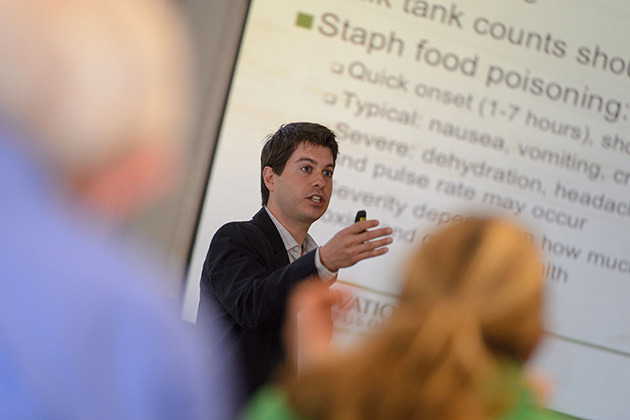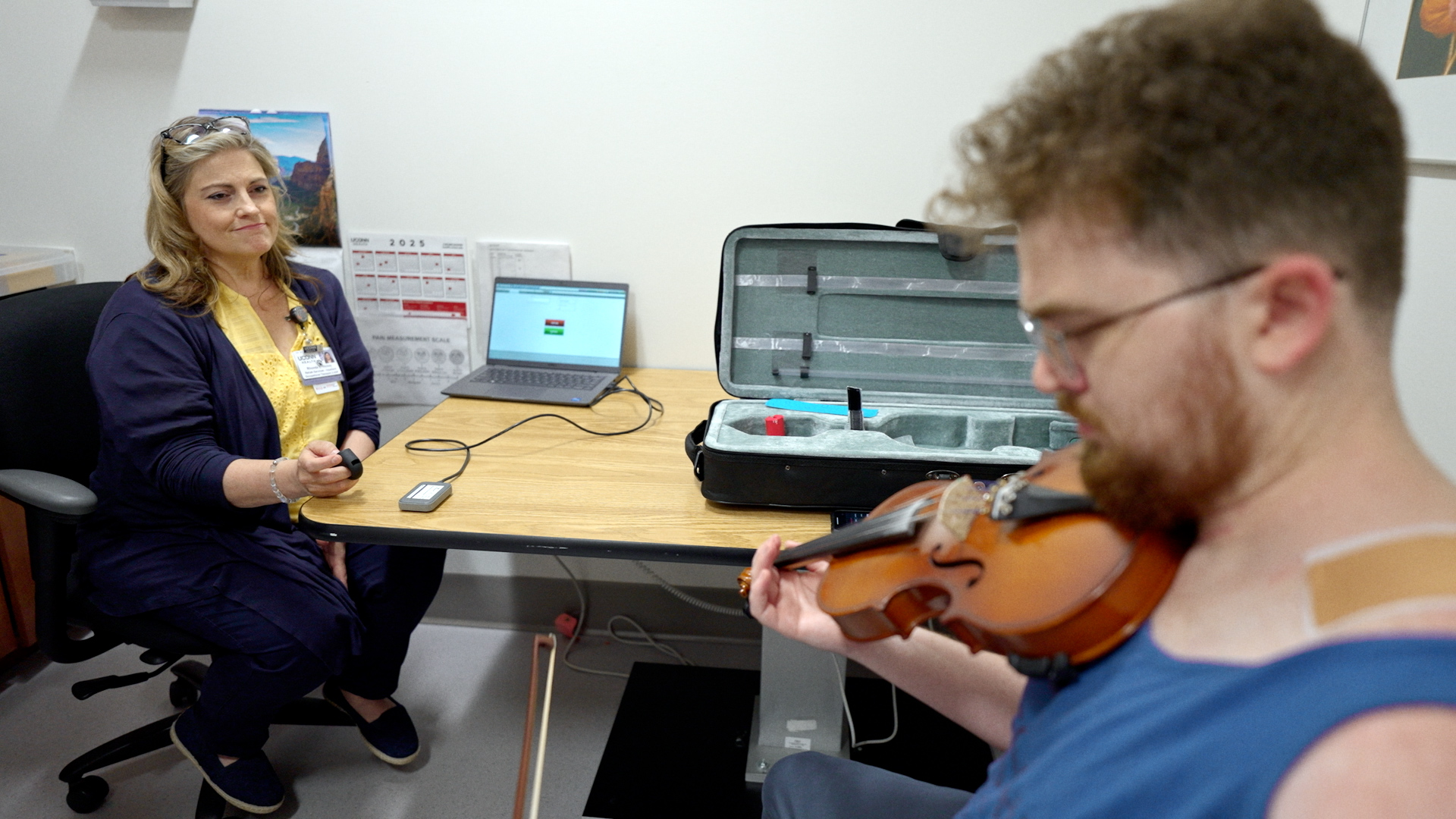
Buying fresh goat cheese at a local farmer’s market or selecting a piece of sharp cheddar from a display of artisanal cheese at the supermarket offers the promise of a nutritious and flavorful snack. Dennis D’Amico, assistant professor in the Department of Animal Science, wants to make sure those cheeses are safe to eat as well.
D’Amico is an expert on the microbiology of artisanal cheese, and his expertise on Listeria species, pathogenic bacteria commonly associated with illness caused by consumption of dairy products, is nationally recognized. Before coming to UConn last year, he served as senior research scientist at the Vermont Institute for Artisan Cheese at the University of Vermont.
D’Amico has begun making cheddar, juustoleipa, and queso blanco for retail sales at the UConn Creamery. He notes that the cheese is made from the award-winning milk produced at UConn’s own Kellogg Dairy Center. “The secret to making great cheese is starting with great milk, and we have that in abundance here,” D’Amico says. “I’m glad we’re now in a position to add top quality cheese to the award-winning ice cream we already sell at the Dairy Bar.”
In recent years, locally produced food products – including dairy – have surged in popularity. At the same time, the federal government wants to keep people safe from food-borne illnesses, and that includes oversight of small, independent farmers who sell their food products close to home.
That’s where D’Amico enters the picture.
“My interest lies in conducting research and transferring knowledge to help small farmers improve the safety and quality of cheese, while complying with federal regulations,” D’Amico says.
His research examines the presence, ecology, and diversity of pathogens in small to very small farms and dairy processing facilities. That includes measuring the incidence of pathogenic bacteria in raw milk to be used in cheese making.
Advocating for small business
With the passage of the Food Safety Modernization Act of 2010, the focus of federal regulations shifted from responding to incidents of food contamination to preventing contamination in the first place. D’Amico says his goal is to identify natural interventions, and put controls in place that will allow producers to continue following traditional cheese-making procedures, while complying with federal regulations and producing safe food.
“A lot of the rules initially put in place that apply to large commercial dairy operations are difficult to translate to small, individually owned dairies,” he notes. “I guess you can say I’m an advocate for the little guy.”
As part of his advocacy, D’Amico works with cheese producers on everything from establishing ‘best practices’ to eliminate cross-contamination of production areas, to instituting ways to make the pasteurization process more efficient.
He also hopes to create a cell phone app to aid in producing safe, minimally processed foods.
Most small dairies use batch pasteurizers to heat milk to the necessary temperature to kill pathogens, he explains, but this is time-consuming and often leads to ‘overkill’ in the elimination of pathogens of concern. Among the things D’Amico is doing to make the process more efficient is determining exactly how long it takes a certain amount of milk to reach a desired temperature, and how long it has to be held at that level in order to reach safety standards.
“An app would make it easy to plug in the parameters and get an immediate answer,” he says. “Things like that increase the efficiency and productivity of small operations.”
Providing assistance to local dairy producers is part of UConn’s obligation as the state’s land grant university, but D’Amico’s reputation is a national one, thanks to his ongoing work with the Innovation Center for U.S. Dairy.
”The dairy industry recognizes that artisanal and farmstead cheese makers are here to stay, and it’s in their best interests to make sure that the products they produce are safe to eat,” he says. That’s why the dairy industry sponsors a training program that D’Amico developed called ‘Artisan/Farmstead Cheese Maker Food Safety Workshop,’ which is designed to help educate regulators, inspectors, retailers, and cheese makers alike on the topic of artisan cheese making and safety. He has traveled all over the country offering this training.
The workshop covers topics ranging from the efficacy of pathogen preventive controls, to the control and monitoring of environmental pathogens, to local and state rules impacting artisan/farmstead cheese making.
“Rather than considering small producers a threat, the dairy industry looks at them as a valuable addition,” D’Amico says, “as long as best practices are followed.”
D’Amico will teach a 3000-level course on ‘Animal Food Products: Dairy Technology’ in the College of Agriculture, Health, and Natural Resources (CAHNR) in the spring.


